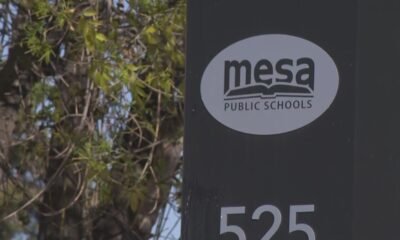antisemitism
College Antisemitism Sparks Urgent ‘Encampment’ Law from House

In a contentious legislative session, the Arizona House approved a bill aimed at prohibiting “encampments” on college and university campuses, despite concerns over potential First Amendment violations. The measure passed with a vote of 41-17 on Monday, initiated by Rep. Alma Hernandez, who cited troubling incidents from last year’s pro-Palestinian and anti-Israel protests.
Hernandez, a Tucson Democrat and a member of the Jewish community, stressed that the intent is not to restrict protests but to ensure that students can attend classes without disruption. “Nothing in the First Amendment protects an encampment,” she asserted.
Her comments are backed by personal experience. “I, first-hand, have experienced it,” she stated, sharing her concerns with fellow lawmakers.
Supportive voices emerged, including Rep. Teresa Martinez from Casa Grande. She noted, “There’s an antisemitism feeling running through this country. It needs to stop.” Martinez framed the response to recent events, including the escalation in Gaza following Hamas’ attacks, as a well-funded initiative rather than spontaneous activism.
Martinez emphasized the need to stand in solidarity with Jewish communities, warning that such measures are necessary to prevent discrimination against various groups. “If we don’t take a stand,” she argued, “then no one else will.”
However, dissenters raised alarms about potential overreach. Rep. Anna Abeytia expressed concern regarding the bill’s implications for protests, noting that encampments are akin to sit-ins with historical significance, particularly within Chicano culture. Similarly, Rep. Quantá Crews warned that the bill could be misused against those exercising their rights to protest without malicious intent.
Some lawmakers, including Rep. Alexander Kolodin, questioned the definition of “encampment” in the bill. He warned that its broad language might inadvertently target legitimate activities carried out by conservative groups, raising concerns about selective enforcement based on political affiliation.
This sentiment was echoed by Rep. Justin Olson, who highlighted ambiguities, particularly regarding what constitutes a “prolonged period of time.” He called for clarity as the legislation moves to the Senate for further consideration.
Despite these critiques, Hernandez maintained that her proposal adequately addresses issues of disruption on campuses. She recounted a situation at the University of Arizona where a group allegedly refused to vacate until their demands were met, which she deemed unreasonable.
As debates continue, the future of this legislation will hinge on its interpretation and the potential consequences for student activism across Arizona campuses.


















